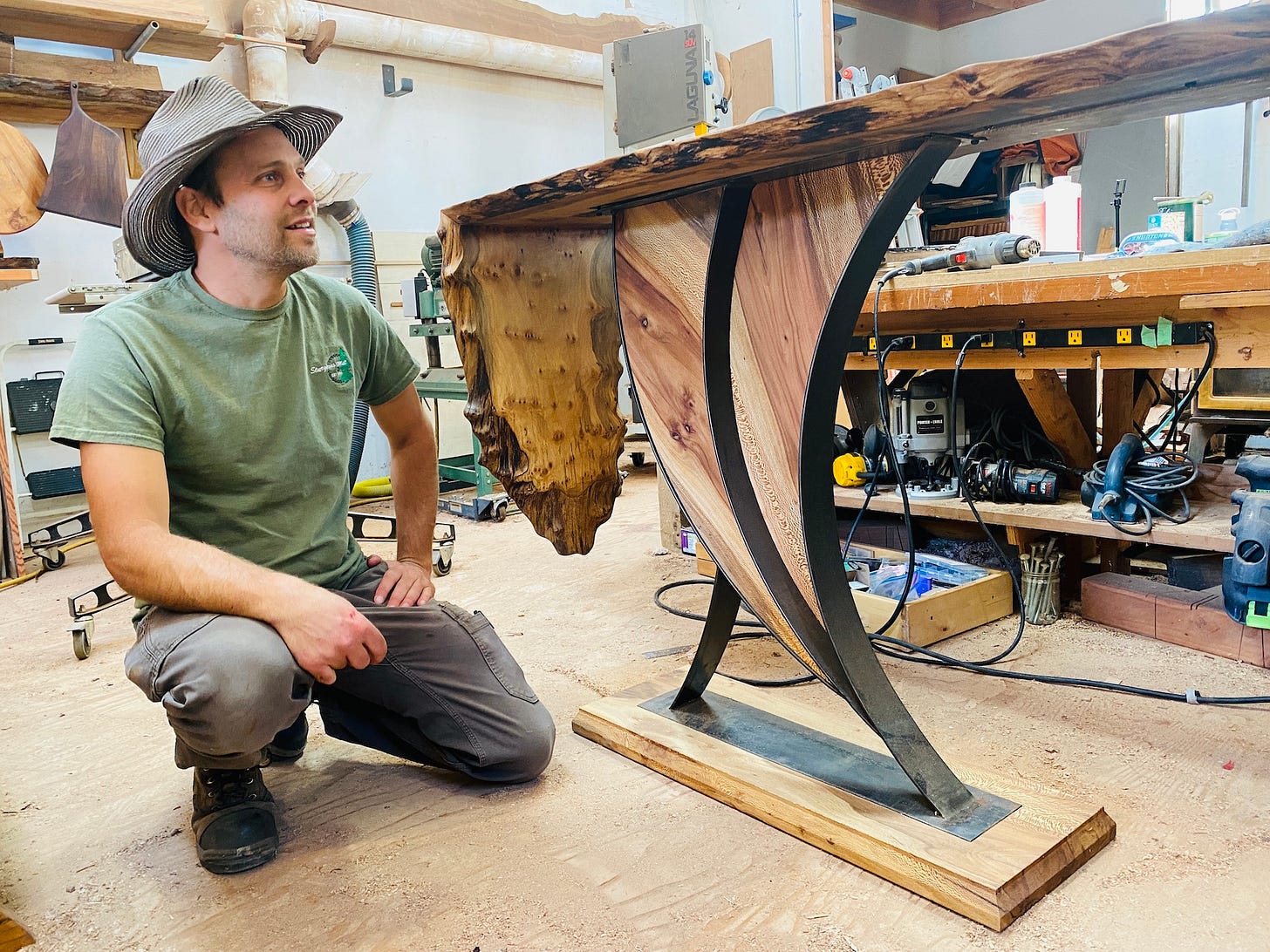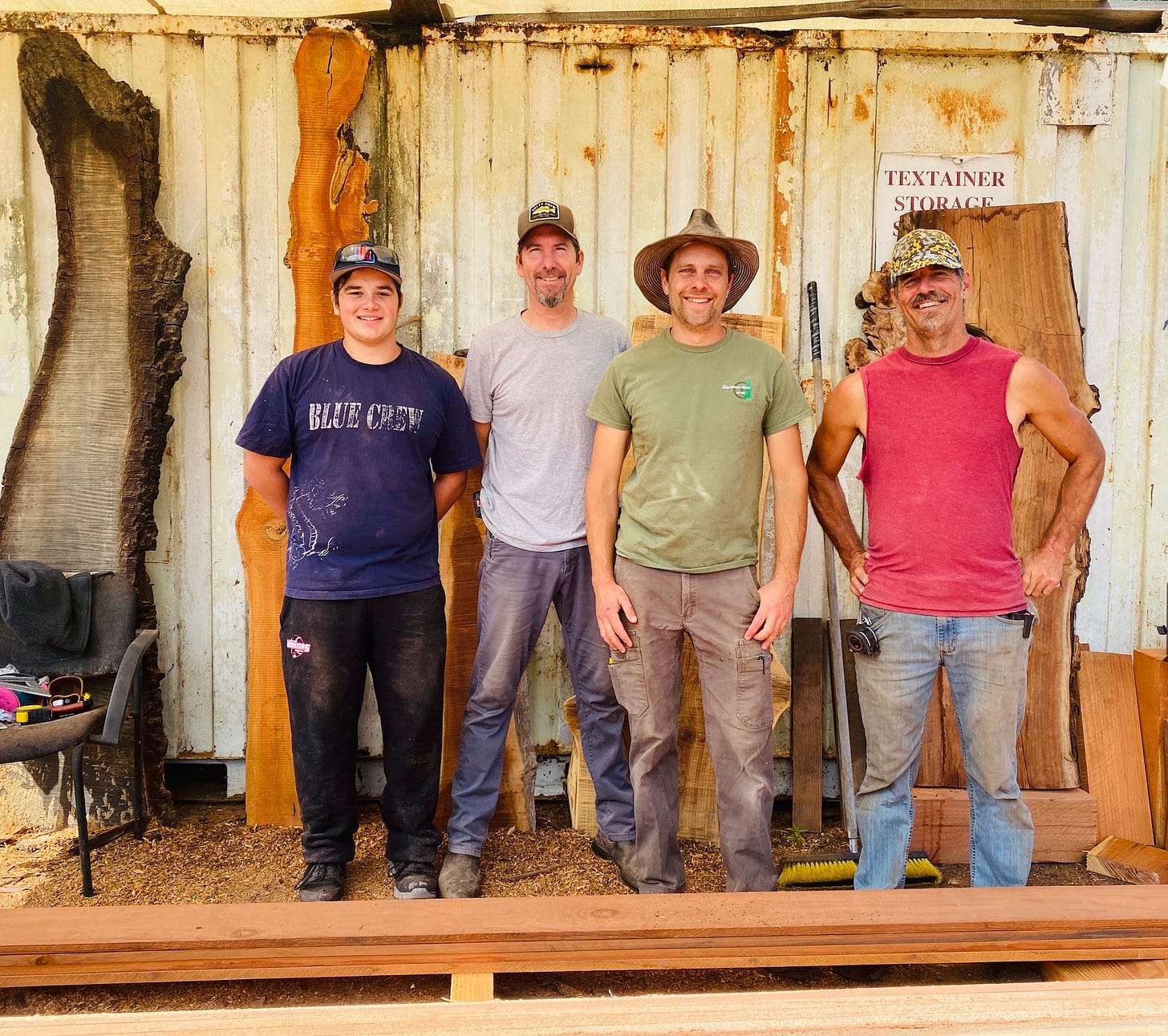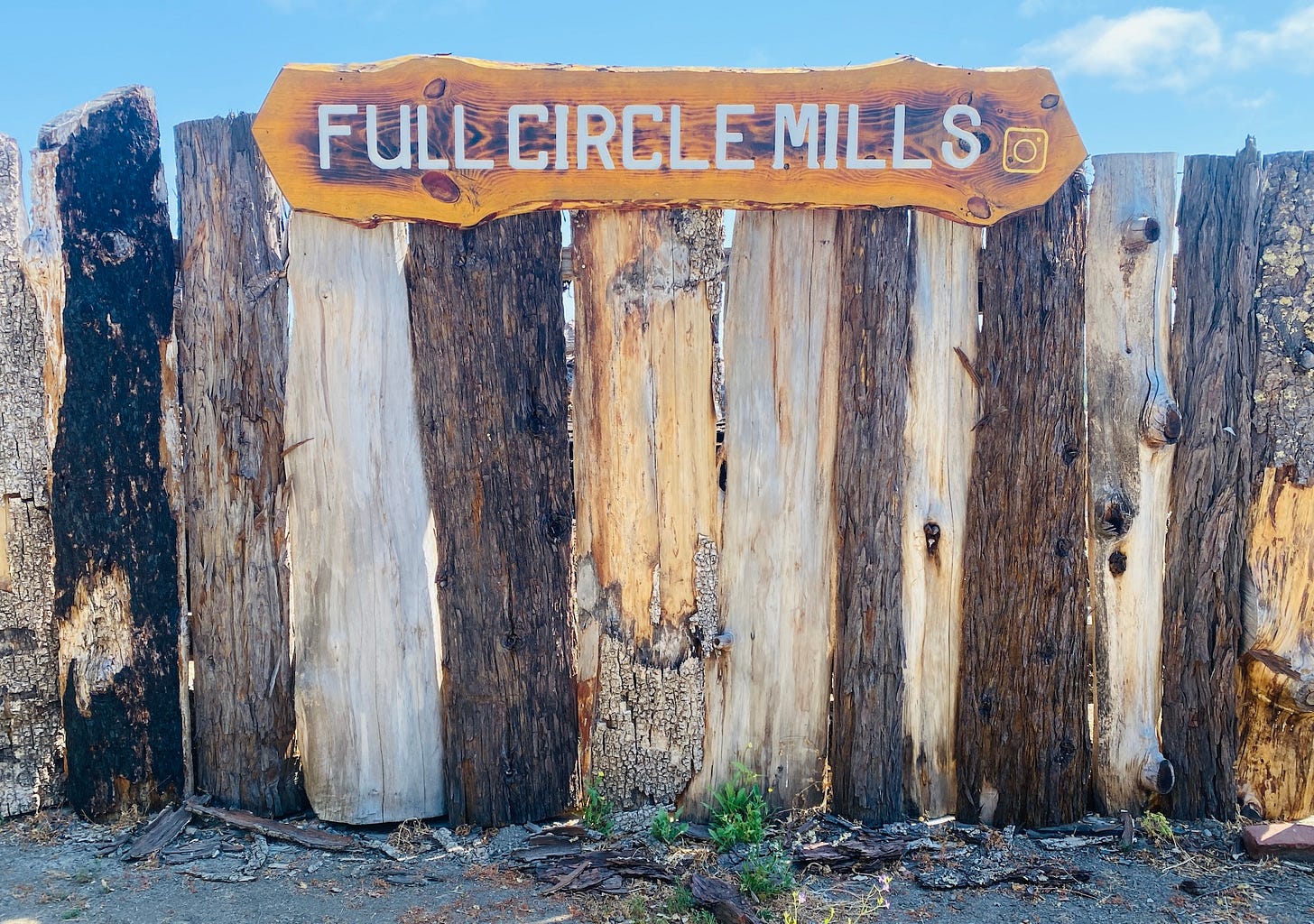It’s all in the buzz
Full Circle Mills recycles local logs into lumber and usable art

Osha Levgin, 44, of Sebastopol, is a creator at heart. In a previous life he pursued a singer/songwriter path, even releasing an album called Mirrors of the Wild. He also traveled widely in Mexico and lived in Arizona, Argentina, San Francisco and Los Angeles in his younger years, trying his hand at woodcarving along the way. These days he brings his inherent creativity to Full Circle Mills, the local sawmill and furniture-making enterprise he opened and works at full time.
“I was never particularly inclined to be business oriented,” he writes, “but I love the process of working with clients and finding creative solutions to challenges that arise. Launching the business during COVID, while not on purpose, turned out to work in our favor as many people started working from home and realized they needed to remodel or wanted new custom desks made from their own backyard tree. It also was easy to maintain social distancing, as we mostly worked outside.”
On a July weekday morning, Full Circle Mills’ West County work site is awash with mounds of logs, piles of sawdust and drying boards and slabs laid out in neat stacks. Levgin and his crew—Scott McGiniss, Carey Campbell, Reece Thomas and Andrew Somawang—are hard at work and the site is literally abuzz with activity as the men mill redwood logs on two portable sawmills, then stack the planks for drying.

This batch of lumber is destined to fill a local contractor’s order, providing the exterior siding and the interior ceiling and wall paneling for a new barn being built by Sebastopol’s own Thrive Construction. The lumber will be dried in the on-site vacuum kiln for five to seven days and then delivered within the week. But there is enough wood laying around for any number of projects.
Sourcing the wood is part of the magic of Levgin’s enterprise. He procures logs from all around Sonoma County, but mostly from West County’s Occidental area. Typically, homeowners find him or tree companies recommend him. He also stays in touch with other locals, such as Marc Lepp, who run their own mills, too. Very often the trees have fallen on their own.
“I’m connected with multiple tree companies around the area,” he says. “Oftentimes they will suggest to their client: this is valuable lumber. If you want to give it to somebody locally, here’s a guy who can make something out of it.”
Levgin works with all types of trees, including Douglas fir, redwood, eucalyptus, oak and walnut. And while much of the wood ends up being used to side barns, houses and workshops, the furniture-making process allows him to utilize the size, shape, uniqueness and inherent beauty in each piece of wood for maximum artistic expression.
“I came into the business starting by building furniture and ended up buying a sawmill as a tool for building furniture,” he says. Not the other way around.
He milled his first log in Sebastopol right after the Tubbs Fire. It belonged to a family that had lost their home and several large trees in the disaster.
“But even though the trees died and had to be taken down, the wood inside was still good,” he says. “It was just scorched on the outside.”
After milling the tree, he dried the slabs out and made a dining table for the family’s new home—a reminder for them of their pre-Tubbs life.
When people don’t want a reminder of the tree and the disaster that befell it and them, Levgin offers to make them a small shrine or keepsake with some of the wood. “Let’s honor this tree,” he tells them. “It was a beautiful tree until it fell. Once it fell it did damage and it was traumatic, but that’s not the whole story of the tree.”
Levgin’s reverence for the wood he harvests is evident in the wildly whimsical furniture he designs and builds. Using bandsaws, jigsaws, sanders and any number of other tools, he fits the pieces of smoothed, shaped wood together and oils them. He welds metal frames and stands for some pieces and hand-hammers copper sections for others. The wood itself is exquisite, revealing deep colors and rich patterns in its grains. Some pieces of furniture incorporate wood cut from different parts of the same tree.
Robust, well-oiled charcuterie boards hang in his woodshop, along with examples of the furniture he makes, to allow clients to get a feel for his expertise. But, while the boards are fun to make and give him something to do between other projects, Levgin says, “I really don’t want to be in the charcuterie board business. There’s plenty of guys doing that.”
Ultimately, his furniture blurs the edge between usability and fine art, between use and decoration. Everything he makes—tables, shelves, desks, beds, benches, wall hangings and sculptures—has a tactile element to it. He sees it all as art that is meant to be felt, if not held.
These days Levgin makes his home in North Sebastopol with his partner, Jenny Iger, and their 9-year-old son, Elijah. They host a booth for his business at the HEAD WEST marketplace when they can, and he sometimes brings Elijah to work with him.
“He loves coming out here and climbing on the logs,” Levgin says.
Levgin’s plans for the future? More artistic pieces, possibly even hanging or tactile art. He considers himself a sawyer, a furniture maker and, ultimately, a fine artist, with wood as his primary medium.
“My goal is to keep developing my artistic sense and expanding my repertoire of functional art, sculpture and fine art,” he writes. “I love bringing a unique view of nature into a home or business, giving us an opportunity to reflect on our own connection and our place in the world environment we call home.”
Full Circle Mills. osha@fullcirclemills.com. (707) 200-3578. www.fullcirclemills.com



